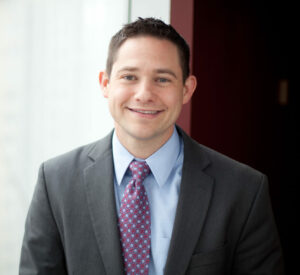Meet Our Team: Q&A with Brian McGuckin, Senior Vice President
Brian McGuckin oversees client servicing for the firm’s Medicaid financing engagements including management of client relationships, strategy, policy, resource allocation, project management, and subject matter expertise. He is uniquely qualified to guide the Medicaid financing practice and ensure the strategic growth of the firm in this area, having worked at the Sellers Dorsey for almost 19 years. Brian and his team are responsible for ensuring client satisfaction and successful achievement of client goals. He has extensive experience leading Medicaid Financing client engagements, having worked with large health systems and state agencies across the U.S. to develop and implement Medicaid financing solutions to improve access and quality for the Medicaid and uninsured populations. He has a bachelor’s degree from Georgetown University and a master’s degree from Harvard University.

What brought you to Sellers Dorsey?
After studying English and Psychology at Georgetown, I received my MA in education from Harvard. I worked as a teacher and eventually worked at the University of Pennsylvania Hospital because of my interest in clinical psychology. However, I was looking for a career change. I met Marty Sellers when the firm was just starting to grow. He offered me a position as a consultant, and I was hired as the firm’s sixth employee.
What’s your special area of expertise?
My expertise lies in assisting clients navigate the complex world of Medicaid financing with the ultimate goal of bringing more financial stability to institutions that treat a high volume of Medicaid and uninsured patients. Medicaid financing is incredibly complicated, and each state finances its Medicaid program in a different way. Having worked in many states throughout the country, I enjoy educating clients and new firm staff on existing mechanisms and studying regulatory changes at the federal level to determine their impact on our clients.
What kinds of projects do you typically work on?
In my role, I work on both client and corporate projects. For the client projects, I have worked directly with a number of state Medicaid agencies and safety-net hospitals on Medicaid financing initiatives involving provider assessments, upper payment limit programs, disproportionate share hospital payments, and other mechanisms. Corporate projects that I have worked on include business process improvement initiatives, product development, training, and organizational structure.
What is one project you’ve worked on that you’re most proud of?
In 2007, the firm started work on the Philadelphia Hospital Assessment program. This program was the first provider assessment program that was limited to a city/county approved by CMS and served as a precursor to the subsequent Pennsylvania statewide hospital assessment program. It was the first project that I worked on since its inception, and I gained essential, in-depth knowledge that stakeholders such as state/city officials and hospital CEOs relied on. Fifteen years later, the initiative continues to bring much needed resources to hospitals within the City of Philadelphia that treat a high volume of Medicaid and uninsured patients.
What do you like about working at Sellers Dorsey?
The people I get to work with are the best part of being at Sellers Dorsey. The firm’s team members all have a commitment to improving access and quality of care for vulnerable populations, and that commitment attracts a diverse and caring group of people to the firm. The dedication, creativity, and intelligence of the folks at Sellers Dorsey never cease to amaze me. My trust and confidence in the people I work with is the reason I’ve stayed at the firm for so many years.
How has your work changed over time?
Throughout the time I’ve spent at Sellers Dorsey, there have been a myriad of policy and regulatory changes in Medicaid at the federal level, including the implementation of the Affordable Care Act. As consultants, our job is to learn about these changes and help determine their implications for our clients. Every change creates challenges and possibilities, and I have enjoyed working with our teams over the years to help our clients realize the opportunities these changes present.
What do you believe lies ahead in the next couple of years for the firm?
As the health care industry moves more towards paying for outcomes instead of paying for volume, the work of our firm will become even more connected with improving the quality of care for vulnerable populations. This shift in payment philosophy represents a big change for providers, and we can assist clients in aligning their clinical, operations, and finance departments to work in collaboration. I think we will continue to work with clients to identify and implement operational and clinical changes to help them to achieve improved quality and to access all available funding.
What is one important thing you have learned during your time at Sellers Dorsey?
I’ve learned that relationships are of critical importance in the work we do. Getting to know our clients, working to understand their unique challenges, and collaborating with them to find solutions is truly the work of the firm. Forming deep relationships with our clients is the foundation of the success of our initiatives, and it has been an incredible experience to work to build those relationships over the years. The importance of strong relationships carries over to interactions within the firm, too. At Sellers Dorsey, we all work together on complex issues that have big impacts, and I depend every day on strong relationships with my colleagues to make that collaboration work.

